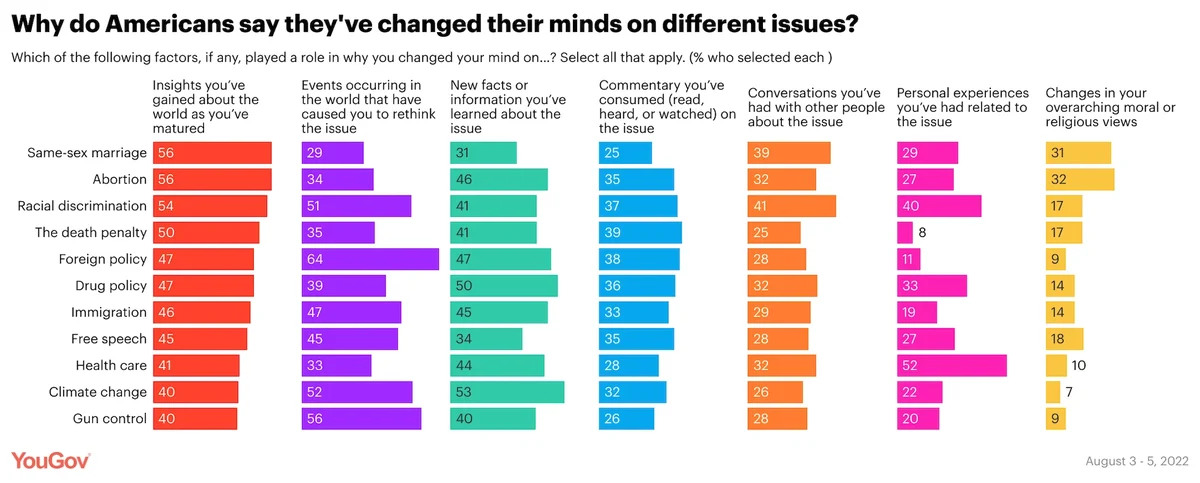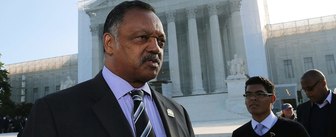At times, Americans can seem pretty set in their ways when it comes to politics. Yet a recent YouGov poll finds that the vast majority of people (at least 78%) say they’ve changed their minds on one or more political issues throughout the course of their lives. The topics on which Americans are most likely to say they’ve changed their minds are foreign policy, drugs, and health care. People cite different reasons for shifting their perspectives on each issue: on foreign policy, they cite current events; on drug policy, new facts they’ve learned; on health care, personal experiences.
To find out which subjects Americans are most likely to have shifted their perspectives on, we first asked them to tell us in their own words about times in their lives they’d changed their minds on a political issue, as well as how and why their views changed. Based on these responses, we developed a list of 11 issues people frequently change their minds on, as well as a list of seven common reasons why a person’s mind could change. We then, in a follow-up poll, asked 1,000 Americans whether they’d changed their minds on these 11 issues, and which, if any, of the seven reasons we provided played a role in their new way of thinking.
Roughly three-quarters of Americans (78%) say they’ve changed their minds on at least one of the 11 issues asked about. On average, people say they changed their minds on three of the issues. Conservatives, and especially people who say they’re very conservative, are less likely than liberals to say they’ve changed their opinion on at least one issue: While 90% of people who are very liberal say they’ve changed their minds on at least one issue asked about, only 63% of people who are very conservative say they have. On average, people who are very liberal say they’ve changed their mind on four of the issues polled about, while people who are very conservative only report changing their mind on an average of two.
Which issues are Americans most likely to have changed their minds on? Below, we present the share of Americans who say they’ve changed their minds on each of the 11 issues polled, ranked from most to least likely:
- Foreign policy (42% have changed their mind on)
- Drug policy (40%)
- Health care (35%)
- The death penalty (33%)
- Immigration (31%)
- Same-sex marriage (29%)
- Gun control (29%)
- Racial discrimination (27%)
- Abortion (27%)
- Climate change (27%)
- Free speech (17%)
In terms of how ideology relates to the likelihood that a person will have changed their mind on a certain issue, we find that self-described moderates are the group most likely to say they’ve changed their mind on six of the issues asked about (health care, immigration, gun control, racial discrimination, abortion, and climate change), while liberals are most likely to say they’ve changed their minds on five (foreign policy, drug policy, the death penalty, same-sex marriage, and free speech). There are only two issues on which conservatives are more likely to say they’ve changed their mind than liberals: health care and abortion. (Moderates were more likely than conservatives to have changed their mind on each of the 11 issues.) On most other issues, however, liberals are far more likely than conservatives to say they’ve changed their minds. Perhaps the most notable gap is on the death penalty: 50% of liberals say they’ve shifted their views on it, compared to only 20% of conservatives.
When asked how their minds changed, on most of the 11 issues people are more likely to say their perspective became more liberal rather than more conservative. Two-thirds of people (68%) who say they changed their mind on same-sex marriage say they gained a more liberal perspective on the issue, compared to only 13% who say their views became more conservative. Far more also say their views liberalized, rather than became more conservative, on abortion, the death penalty, drug policy, racial discrimination, health care, gun control, and climate change. The only two issues on which a significantly larger share of people say they became more conservative, rather than more liberal, are immigration (47% more conservative, 33% more liberal) and foreign policy (38% more conservative, 30% more liberal).
In an earlier survey, we asked Americans who had changed their minds on different issues to tell us in their own words why their views changed. Based on these responses, we developed for this poll seven broad categories of reasons why a person might change their mind on an issue. These include (1) new insights they’ve gained through maturity, (2) events occurring in the world, (3) new facts or information they learn, (4) commentary they consume, (5) conversations with other people, (6) personal experiences, and (7) changes in their overarching moral or religious views. Respondents who'd changed their minds on an issue could choose any of the seven reasons that played a role in their shift in point of view.
The reasons that people give for changing their minds differ based on the issue asked about. For instance, most people who say they changed their opinions on foreign policy, gun control, and climate change cite events occurring in the world as an impetus for their new perspective on these issues. Another issue that stands out is health care: Half of people who say they changed their mind cite personal experiences related to health care as a reason. Views on other topics – such as same-sex marriage and abortion – are more likely than other issues to be affected by general insights and maturity, as well as by changes in a person’s overarching moral or religious views.

– Carl Bialik contributed to this article
This poll was conducted on August 3 - 5, 2022, among 1,000 U.S. adult citizens. Explore more on the methodology and data for this poll.
Image: Benjamin Davies on Unsplash













